| Listing 1 - 10 of 11 | << page >> |
Sort by
|
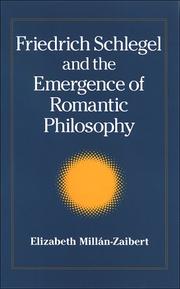
ISBN: 0791480097 1429471565 9781429471565 9780791480090 0791470830 9780791470831 9780791470848 0791470849 Year: 2007 Publisher: Albany : State University of New York Press,
Abstract | Keywords | Export | Availability | Bookmark
 Loading...
Loading...Choose an application
- Reference Manager
- EndNote
- RefWorks (Direct export to RefWorks)
This book addresses the philosophical reception of early German Romanticism and offers the first in-depth study in English of the movement's most important philosopher, Friedrich Schlegel, presenting his philosophy against the background of the controversies that shaped its emergence. Elizabeth Millán-Zaibert begins by distinguishing early German Romanticism from classical German Idealism, under which it has all too often been subsumed, and then explores Schlegel's romantic philosophy (and his rejection of first principles) by showing how he responded to three central figures of the post-Kantian period in Germany—Jacobi, Reinhold, and Fichte—as well as to Kant himself. She concludes with a comprehensive critique of the aesthetic and epistemological consequences of Schlegel's thought, with special attention paid to his use of irony.
Romanticism --- Schlegel, Friedrich von, --- Schlegel, Friedrich von --- Shlegelʹ, Fridrikh --- Schlegel, Karl Wilhelm Friedrich von --- Von Schlegel, Karl Wilhelm Friedrich --- Schlegel, Friedrich --- Schlegel, Federico --- Schlegel, Frederick von --- Romanticism - Germany. --- Schlegel, Friedrich von, - 1772-1829.
Book
ISBN: 1472594487 1472574834 1472574826 Year: 2014 Publisher: New York : Bloomsbury,
Abstract | Keywords | Export | Availability | Bookmark
 Loading...
Loading...Choose an application
- Reference Manager
- EndNote
- RefWorks (Direct export to RefWorks)
"Hegel's critique of Early German Romanticism and its theory of irony resonates to the core of his own philosophy in the same way that Plato's polemics with the Sophists have repercussions that go to the centre of his thought. The Anti-Romantic examines Hegel's critique of Fr. Schlegel, Novalis and Schleiermacher. Hegel rarely mentions these thinkers by name and the texts dealing with them often exist on the periphery of his oeuvre. Nonetheless, individually, they represent embodiments of specific forms of irony: Schlegel, a form of critical individuality; Novalis, a form of sentimental nihilism; Schleiermacher, a monstrous hybrid of the other two. The strength of Hegel's polemical approach to these authors shows how irony itself represents for him a persistent threat to his own idea of systematic Science. This is so, we discover, because Romantic irony is more than a rival ideology; it is an actual form of discourse, one whose performative objectivity interferes with the objectivity of Hegel's own logos. Thus, Hegel's critique of irony allows us to reciprocally uncover a Hegelian theory of scientific discourse. Far from seeing irony as a form of consciousness overcome by Spirit, Hegel sees it as having become a pressing feature of his own contemporary world, as witnessed in the popularity of his Berlin rival, Schleiermacher. Finally, to the extent that ironic discourse seems, for Hegel, to imply a certain world beyond his own notion of modernity, we are left with the hypothesis that Hegel's critique of irony may be viewed as a critique of post-modernity."--Bloomsbury Publishing.
Romanticism --- Novalis, --- Hegel, Georg Wilhelm Friedrich, --- Schlegel, Friedrich von, --- Schleiermacher, Friedrich,
Book
ISBN: 3110380315 3050093870 9783050093871 9783050093888 3050093889 3050058366 9783050058368 Year: 2014 Publisher: Berlin
Abstract | Keywords | Export | Availability | Bookmark
 Loading...
Loading...Choose an application
- Reference Manager
- EndNote
- RefWorks (Direct export to RefWorks)
"Einer weit verbreiteten, auch und gerade in den Poetik-Vorlesungen unserer Tage emphatisch vertretenen Vorstellung zufolge ist der poeta doctus eine historisch versunkene Figur. Seit den letzten Jahrzehnten des achtzehnten Jahrhunderts wird als selbstevident vorausgesetzt, dass man nicht aus dem gelehrten Wissen heraus dichte, sondern aus der unmittelbaren Erfahrung, aus dem sich zum Wort und Bewusstsein drängenden Gefühl. Die hier versammelten Studien Christoph Königs verabschieden diesen Gemeinplatz. Königs Kunst der eindringlich-spekulativen Lektüre erschließt die Intensität der Imagination, die sich dort entzündet, wo Poesie und Philologie eine ebenso innige wie reflektierte Verbindung eingehen. Moderne Dichtung in ihren höchsten Erscheinungsformen erweist sich als sublimierte Hermeneutik, moderne Philologie in ihren bedeutendsten Leistungen als poetisches Leseexperiment. Anhand von exemplarischen Fallstudien (unter anderem zu Wilhelm von Humboldt, Schiller, Goethe, Friedrich Schlegel, Lönnrot, Hofmannsthal, Gadamer, Szondi und Bollack) entwirft Christoph König ein überzeugendes Bild der spannungsvollen Zweiheit von Poesie und Philologie, das unser Verständnis der literarischen Moderne grundlegend modifiziert." David E. WellberyUniversity of Chicago
German poetry --- German philology. --- Germanic philology --- History and criticism. --- Aesthetics. --- Goethe, Johann W. von. --- Humboldt, Wilhelm von. --- Schiller, Friedrich von. --- Schlegel, Friedrich von.
Book
ISBN: 9781472574817 9781472574824 9781472574831 1472574826 1472574834 9781472594488 1472594487 1322023743 9781322023748 1472574818 Year: 2014 Publisher: London Bloomsbury
Abstract | Keywords | Export | Availability | Bookmark
 Loading...
Loading...Choose an application
- Reference Manager
- EndNote
- RefWorks (Direct export to RefWorks)
"Hegel's critique of Early German Romanticism and its theory of irony resonates to the core of his own philosophy in the same way that Plato's polemics with the Sophists have repercussions that go to the centre of his thought. The Anti-Romantic examines Hegel's critique of Fr. Schlegel, Novalis and Schleiermacher. Hegel rarely mentions these thinkers by name and the texts dealing with them often exist on the periphery of his oeuvre. Nonetheless, individually, they represent embodiments of specific forms of irony: Schlegel, a form of critical individuality; Novalis, a form of sentimental nihilism; Schleiermacher, a monstrous hybrid of the other two. The strength of Hegel's polemical approach to these authors shows how irony itself represents for him a persistent threat to his own idea of systematic Science. This is so, we discover, because Romantic irony is more than a rival ideology; it is an actual form of discourse, one whose performative objectivity interferes with the objectivity of Hegel's own logos. Thus, Hegel's critique of irony allows us to reciprocally uncover a Hegelian theory of scientific discourse. Far from seeing irony as a form of consciousness overcome by Spirit, Hegel sees it as having become a pressing feature of his own contemporary world, as witnessed in the popularity of his Berlin rival, Schleiermacher. Finally, to the extent that ironic discourse seems, for Hegel, to imply a certain world beyond his own notion of modernity, we are left with the hypothesis that Hegel's critique of irony may be viewed as a critique of post-modernity."--Bloomsbury Publishing.
Theory of knowledge --- Novalis --- Hegel, Georg W.F. --- Schleiermacher, Friedrich Daniel Ernst --- Schlegel, von, August Wilhelm --- Germany --- Romanticism --- Novalis, --- Hegel, Georg Wilhelm Friedrich, --- Schlegel, Friedrich von, --- Schleiermacher, Friedrich,
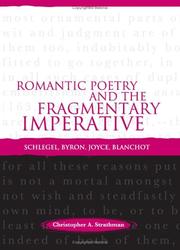
ISBN: 0791464571 079148324X 142374764X 9781423747642 9780791464571 9780791483244 9780791483244 Year: 2006 Publisher: Albany : State University of New York Press,
Abstract | Keywords | Export | Availability | Bookmark
 Loading...
Loading...Choose an application
- Reference Manager
- EndNote
- RefWorks (Direct export to RefWorks)
Uses the concept of the poetic fragment to draw connections between romantic poetry and modern literature and literary theory.
European poetry --- Romanticism --- History and criticism. --- Schlegel, Friedrich von, --- Blanchot, Maurice. --- Knowledge --- Literature. --- European literature --- モーリス・ブランショ --- Бланшо, Морис, --- Blansho, Moris, --- Blanshoy, Moris, --- Schlegel, Friedrich von --- Shlegelʹ, Fridrikh --- Schlegel, Karl Wilhelm Friedrich von --- Von Schlegel, Karl Wilhelm Friedrich --- Schlegel, Friedrich --- Schlegel, Federico --- Schlegel, Frederick von
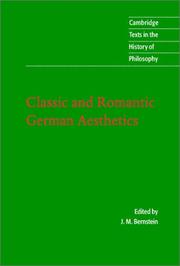
ISBN: 1107131243 128043354X 0511803737 113914734X 0511178468 0511063768 0511057431 0511330561 0511072228 9780511063763 9780511057434 9780521806398 0521806399 9780511803734 9780511072222 0521001110 9780521001113 Year: 2003 Publisher: Cambridge Cambridge University press
Abstract | Keywords | Export | Availability | Bookmark
 Loading...
Loading...Choose an application
- Reference Manager
- EndNote
- RefWorks (Direct export to RefWorks)
This 2002 volume brings together major works by German thinkers, writing just prior to and after Kant, who were enormously influential in this crucial period of aesthetics. These texts include the first translation into English of Schiller's Kallias Letters and Moritz's On the Artistic Imitation of the Beautiful, together with translations of some of Hölderlin's most important theoretical writings and works by Hamann, Lessing, Novalis and Schlegel. In a philosophical introduction J. M. Bernstein traces the development of aesthetics from its still rationalist and mimetic construction in Lessing, through the optimistic construal of art and/or beauty as the appearance of human freedom in the work of Schiller, to Hölderlin's darker vision of art as the memory of a lost unity, and the variations of that theme - of an impossible striving after the lost ideal - which are found in the work of Schlegel and Novalis.
Aesthetics, German. --- Arts, Classical --- Classical arts --- German aesthetics --- Aesthetics. --- Philosophy. --- Aesthetics, German --- Aesthetics --- Philosophy --- Philosophy, German --- Esthétique allemande --- Philosophie allemande --- Hölderlin, Friedrich, --- Novalis, --- Schlegel, Friedrich von, --- Arts and Humanities
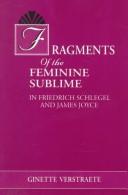
ISBN: 0585076456 9780585076454 0791436276 1438422911 9781438422916 Year: 1998 Publisher: Albany State University of New York Press
Abstract | Keywords | Export | Availability | Bookmark
 Loading...
Loading...Choose an application
- Reference Manager
- EndNote
- RefWorks (Direct export to RefWorks)
English fiction --- Fiction --- Femininity in literature. --- Aesthetics, German --- Sublime, The, in literature. --- Modernism (Literature) --- Romanticism --- Femininity (Psychology) in literature --- English literature --- Irish authors --- German influences. --- History and criticism --- Theory, etc. --- Joyce, James, --- Schlegel, Friedrich von, --- Schlegel, Friedrich von --- Shlegelʹ, Fridrikh --- Schlegel, Karl Wilhelm Friedrich von --- Von Schlegel, Karl Wilhelm Friedrich --- Schlegel, Friedrich --- Schlegel, Federico --- Schlegel, Frederick von --- Joyce, James Augustine Aloysius --- Joyce, James --- Dzhoĭs, Dzheĭms Avgustin Aloiziĭ --- Džoiss, Džeimss --- Gʻois, Gʻaims --- Joyce, Giacomo --- Jūyis, Jīms --- Tzoys, Tzaiēms --- Tzoys, Tzeēms --- Джойс, Джеймс --- Джойс, Джеймс Августин Алоїсуїс --- Zhoĭs, Zheĭms --- ג׳ויס, ג׳ײמס, --- ג׳ויס, ג׳יימס, --- ジョイス --- ジェームスジョイス, --- Aesthetics.
Book
ISBN: 3839407095 Year: 2015 Publisher: Bielefeld transcript Verlag
Abstract | Keywords | Export | Availability | Bookmark
 Loading...
Loading...Choose an application
- Reference Manager
- EndNote
- RefWorks (Direct export to RefWorks)
Das Buch widmet sich einer systematischen Rekonstruktion der ästhetisch bestimmten Subjektivität. Ausgehend von einer Analyse der neuzeitlichen (Subjekt-)Metaphysik werden dieser kritisch gegenüberstehende Theorieansätze gelesen, die unter dem Titel »Ästhetik« operieren. Damit wird versucht, konstruktiv an die Kritik der Subjektmetaphysik in den letzten Dekaden (u.a. durch Derrida) anzuschließen und ihre Ressourcen für eine zu dieser Metaphysik alternativen Theorie des Subjekts auszuloten. Die postmoderne Kritik am Subjekt führt nicht zu einer Nivellierung des Subjekts, sondern zu einer Neubeschreibung, die diese Kritik fruchtbar zu machen versucht.
Ästhetik; Subjektivität; Vernunftkritik; Ironie; Ästhetische Erfahrung; Deutsche Philosophiegeschichte; Dekonstruktion; Literaturwissenschaft; Philosophie; Aesthetics; German History of Philosophy; Deconstruction; Literary Studies; Philosophy --- Schlegel, Friedrich von, --- Nietzsche, Friedrich Wilhelm, --- De Man, Paul. --- Kant, Immanuel, --- Deconstruction. --- German History of Philosophy. --- Literary Studies. --- Philosophy.
Book
ISBN: 9780226084060 9780226084237 022608423X 1306269830 9781306269834 022608406X Year: 2014 Publisher: Chicago, Ill. The University of Chicago Press
Abstract | Keywords | Export | Availability | Bookmark
 Loading...
Loading...Choose an application
- Reference Manager
- EndNote
- RefWorks (Direct export to RefWorks)
The absolute was one of the most significant philosophical concepts in the early nineteenth century, particularly for the German romantics. Its exact meaning and its role within philosophical romanticism remain, however, a highly contested topic among contemporary scholars. In The Romantic Absolute, Dalia Nassar offers an illuminating new assessment of the romantics and their understanding of the absolute. In doing so, she fills an important gap in the history of philosophy, especially with respect to the crucial period between Kant and Hegel. Scholars today interpret philosophical romanticism along two competing lines: one emphasizes the romantics' concern with epistemology, the other their concern with metaphysics. Through careful textual analysis and systematic reconstruction of the work of three major romantics-Novalis, Friedrich Schlegel, and Friedrich Schelling-Nassar shows that neither interpretation is fully satisfying. Rather, she argues, one needs to approach the absolute from both perspectives. Rescuing these philosophers from frequent misunderstanding, and even dismissal, she articulates not only a new angle on the philosophical foundations of romanticism but on the meaning and significance of the notion of the absolute itself.
History of philosophy --- Novalis --- Schelling, von, Friedrich W.J. --- Schlegel, Friedrich --- Germany --- Absolute, The --- Philosophy, German --- German philosophy --- Metaphysics --- Ontology --- One (The One in philosophy) --- History --- Novalis, --- von Schelling, Friedrich Wilhelm Joseph --- Schlegel, Friedrich von, --- Schlegel, Friedrich von --- Shlegelʹ, Fridrikh --- Schlegel, Karl Wilhelm Friedrich von --- Von Schlegel, Karl Wilhelm Friedrich --- Schlegel, Federico --- Schlegel, Frederick von --- Schelling, Friedrich Wilhelm Joseph von --- Schelling, F. W. J. --- Schelling, Friedrich Wilhelm Joseph --- Schelling, Federico Guillermo José --- Novalis, Friedrich --- von Hardenberg, Friedrich Ludwig, --- Hardenberg, Friedrich, --- Hardenberg, Georg Friedrich Philipp, --- Hardenberg, Georg Philipp Friedrich von, --- Absolute, The. --- Schelling, Friedrich Wilhelm Joseph von, --- the absolute, germany, romanticism, philosophy, being, knowing, kant, hegel, epistemology, metaphysics, friedrich schelling, schlegel, novalis, subjectivity, self, hemsterhuis, whole, nature, idealism, ontology, transcendentalism, becoming, freedom, romantic novel, spinoza, fichte, art, identity, nonfiction, goethe, jacobi, von hardenberg, mind, spirit.
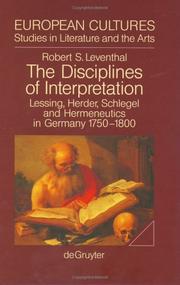
ISBN: 9783110880205 3110880202 3110144247 9783110144246 Year: 2010 Volume: v. 5 Publisher: Berlin Boston
Abstract | Keywords | Export | Availability | Bookmark
 Loading...
Loading...Choose an application
- Reference Manager
- EndNote
- RefWorks (Direct export to RefWorks)
The Disciplines of Interpretation: Lessing, Herder, Schlegel and Hermeneutics in Germany, 1750-1800 (European Cultures : Studies in Literature and a)
Criticism --- Semiotics and literature. --- Discourse analysis, Literary. --- Philology --- Literary discourse analysis --- Rhetoric --- Literary style --- Literature and semiotics --- Literature --- History --- Lessing, Gotthold Ephraim, --- Herder, Johann Gottfried, --- Schlegel, Friedrich von, --- Schlegel, Friedrich von --- Shlegelʹ, Fridrikh --- Schlegel, Karl Wilhelm Friedrich von --- Von Schlegel, Karl Wilhelm Friedrich --- Schlegel, Friedrich --- Schlegel, Federico --- Schlegel, Frederick von --- von Herder, Johann Gottfried --- Von Herder, J. G. --- Lessing, Gotthold Ephraim --- Lai-hsin, --- Lai-hsin, Kao-tʻe-ho-tʻe Ai-fei-la-mu, --- Lessing, Gotkholʹd Ėfraim, --- Lessing, G. E., --- Lessing, Goṭhold Efrayim, --- לסינג, גוטהולד אפרים, --- לעססינג, אפרים ידידיה, --- לעססינג, א. ו., --- לעססינג, גאטהאלד אפרים, --- לעססינג, גאטטהאלד עפראים --- לעססינג, גאטטהלד עפרים, --- לעססינג, ג. ע., --- לעססינג, ידידיה אפרים --- לעססינג, ידידיה אפרים, --- 莱辛, --- Criticism and interpretation.
| Listing 1 - 10 of 11 | << page >> |
Sort by
|

 Search
Search Feedback
Feedback About UniCat
About UniCat  Help
Help News
News